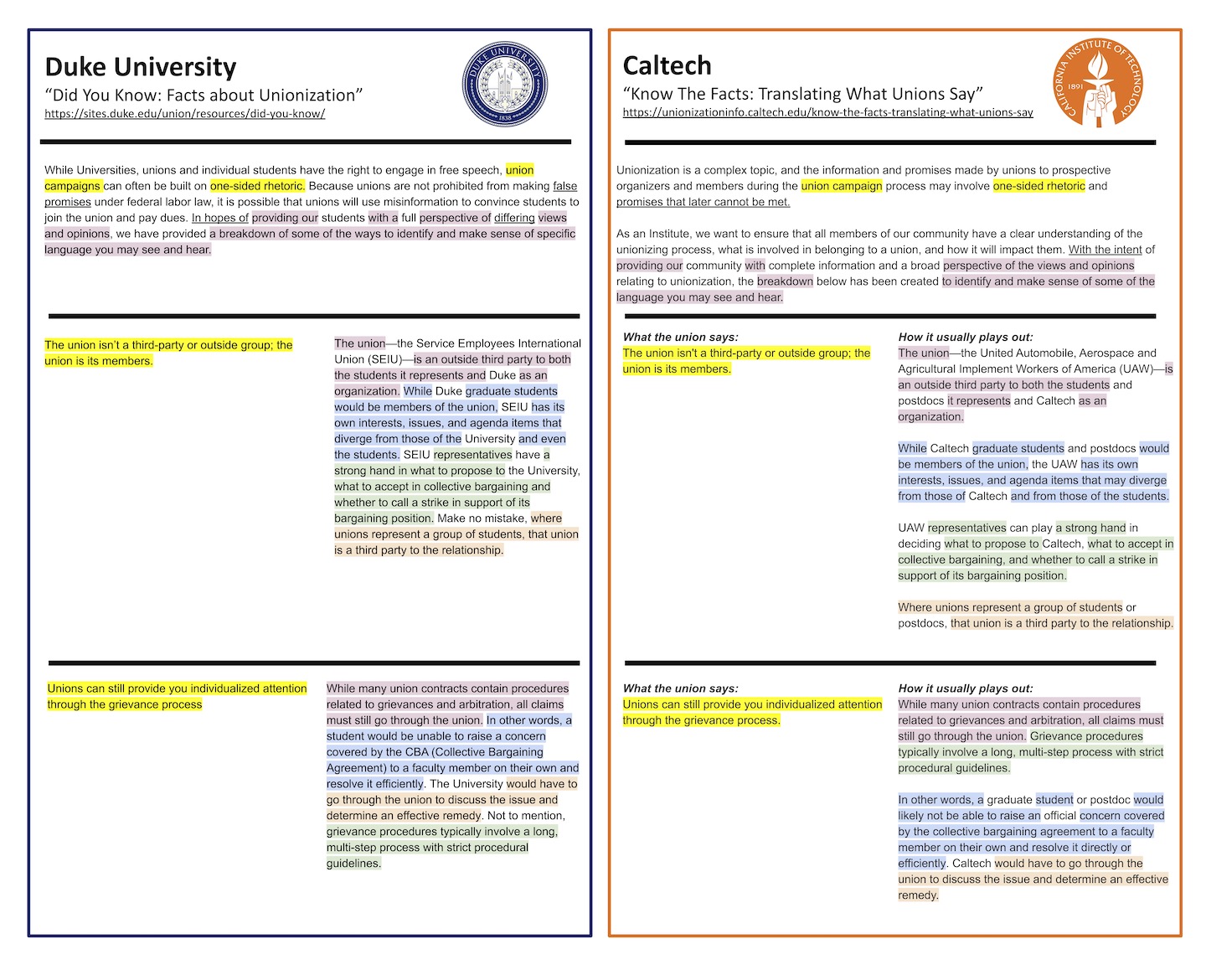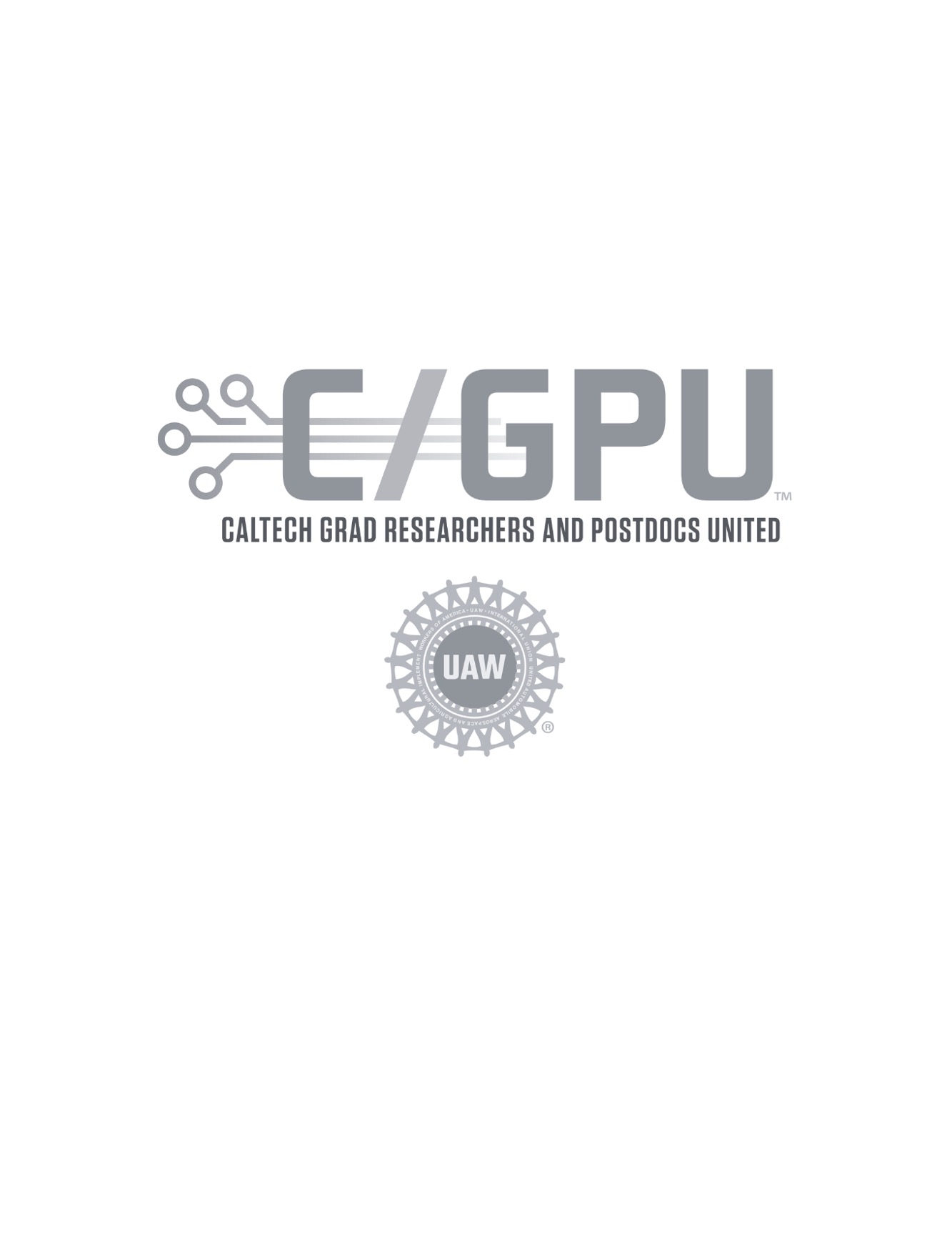
Courtesy of C/GPU
Viewpoint articles are a vehicle for members of the Caltech community to express their opinions on issues surrounding the interface of science and society. The views expressed here do not necessarily reflect the views of Caltech or the editorial board of Caltech Letters. Please see our disclaimer.
Science is a labor of love—love of discovery, and love of pushing the limits of current human knowledge and ability. As graduate student and postdoctoral workers at Caltech, we nourish our cell culture lines on weekends, stay up all night observing through telescopes, spend hours welding devices, and travel long distances to study our world. We care deeply about our science, and we want the best environment in which to do that science.
Some aspects of our environment support our ability to do strong science, such as access to cutting-edge technologies, brilliant colleagues, and compelling classes and seminars. Other factors hinder or harm that ability, particularly for colleagues disadvantaged by our current system: for example, wages that fall short of the cost-of-living year-after-year, unexpected changes or cuts to our health insurance, unsafe laboratory environments, and a history of institutional failures to address mistreatment by faculty. To address these issues and create the best environment in which to do our science, graduate students and postdoctoral scholars across the Institute are in support of forming a union (known as Caltech Graduate Researchers and Postdocs United, or C/GPU). Unionization will allow us to collectively bargain for better working conditions and codify them in an enforceable contract.
Unfortunately, administrators leading Caltech are actively opposed to graduate students and postdoctoral scholars forming a union. In an email to graduate students in May 2023, Dean of Graduate Studies David Chan bluntly wrote, “As Institute leadership, we believe that unionizing is not in the best interest of our students or community”. Provost David Tirrell expressed a similar sentiment, writing in March that unionization would alter the “direct” and “collaborative” relationship between administrators and students.
Why is Caltech against us unionizing? A union will better position us to negotiate for the best conditions to do our science by challenging the current power dynamic where Caltech administrators unilaterally control all aspects of our working conditions. Case-in-point: year after year, the Graduate Student Council has presented Caltech with data-driven, explicit, well-formulated requests for stipend increases that meet the rising costs of living. Each time, Caltech has given marginal increases. Then, after the public debut of Caltech Grads and Postdocs United in December 2022, Caltech announced a sudden $5,000 increase in the graduate student stipend. In a message to faculty, Provost Tirrell explained that this stipend increase would be funded without impacting research budgets. Despite years of pleading from the Graduate Student Council, it took the specter of a union and a possible shift in power to finally persuade Caltech to increase stipends, and prove that they could do so without burdening lab funds. It is no wonder that on May 10th, 2023 the Caltech Graduate Student Council released a statement of support for C/GPU!
Caltech administrators have repeatedly sent graduate students and postdoctoral scholars a link to a website which provides supposedly unbiased “facts about, and resources for, current discussions about the potential Caltech graduate student and postdoctoral scholar unionization.” We were dismayed that much of the information in Caltech’s “Know the Facts” page lacks evidence, and worse, some of the “facts” are blatantly misleading. For example, they provide an example where “if only 100 out of 500 eligible people vote, 51 voters would determine the outcome for all 500 people in the bargaining unit, as well as future graduate students and postdocs”, which would suggest that graduate student and postdoctoral scholar union elections often have low (20%) participation. Twenty percent participation is far lower than any graduate student worker and postdoctoral scholar union election in recent history. Examples include USC, Johns Hopkins, and Yale, where union elections saw participation by 60%, 67%, and 63% of the voting body, respectively, with over 90% voting in favor in all three elections.
In fact, much of the language on Caltech’s webpage is similar to anti-union webpages at other universities. Several of these institutions have hired top-dollar law firms to prevent graduate students from unionizing; Duke University famously funded a legal campaign to challenge the law that graduate students are workers with the right to unionize. Curiously, large sections of the Caltech administration’s webpage are identical to a page about graduate student unionization published by Duke. Caltech graduate students and postdocs have taken the time to research, fact-check, and write critical clarifications to Caltech’s “Know the Facts” webpage.

A side-by-side comparison of the language from the respective anti-union pages from Duke (left) and Caltech (right). Exact language matches are highlighted.
Courtesy of C/GPU
Graduate student and postdoctoral workers drive the research and discovery happening at Caltech. We put all of our intellect (and most of our waking hours) into the generation, analysis, interpretation and dissemination of critical scientific advances. We do this work because we love science and discovery, but at the same time many of us struggle to pay for rent, healthcare, childcare, and international scholar visa and legal fees. Some of us deal with unsupportive or abusive advisors, and work in research settings with very real health hazards. Unionization can address these challenges and enhance our ability to do the scientific work that we love.
The undersigned graduate student workers and postdoctoral scholars have collectively contributed over a century of research and teaching years at Caltech. We have seen the serious hardships many fellow researchers have faced while trying to do their science at Caltech. We came here to work with and learn from Caltech’s world-class faculty, and we believe that a union will allow us to achieve more together. Many faculty, having once been junior researchers themselves, have expressed support for graduate students and postdocs unionizing at Caltech. We advocate not only for ourselves, but for all of our colleagues, especially those in more vulnerable positions. With a union, we will have the ability to bargain for long-overdue improvements and protections, such as:
- Formal grievance procedures and third-party arbitration that puts students and survivors first, similar to mechanisms that the graduate student union at MIT is fighting for and the unions at UC have won
- Protections and rights for international students and scholars
- Written, contractual stipend increases that reflect cost of living every year for graduate students and postdocs
- Guaranteed funding to transition away from toxic lab environments, conditions that Columbia academic workers recently won in their contract
- Affordable health insurance and child care
We have done our homework and made the decision that forming a union is necessary to ensure that we and future scholars at Caltech are best positioned to make discoveries that can positively change our world.
In support of Caltech Grads and Postdocs United (C/GPU):
Alexander Viloria Winnett, BBE, 5 years
Ranjani Murali, BBE/GPS, 6 years
Tom Naragon, CCE, 6 years
William Denman, CCE/GPS, 6 years
Ryan Rubenzahl, PMA, 5 years
Varun Wadia, BBE, 6 years
Mike Greklek-McKeon, GPS, 4 years
Ashay Naren Patel, PMA, 5 years
James Williams, EAS, 3 years
Lambda Moses, BBE, 6 years
Richard Horak, BBE, 3 years
Sasha Alabugin, CCE, 3 years
Sam Ponnada, PMA, 3 years
Tessa Rusch, HSS, 3 years
Rahma Elsiesy, BBE, 2 years
Natasha Reich, CCE, 2 years
Simona Miller, PMA, 2 years
Nadia Suryawinata, BBE, 2 years
Elina Sendonaris, EAS, 2 years
Jasmine Emtage, BBE, 2 years
Ruby Byrne, PMA, 2 years
Quinn Morgan, EAS, 2 years
Matt Ratanapanichkich, CCE, 2 years
Talya Klinger, PMA, 1 year
Elisabetta Benazzi, CCE, 1 year
Daniel Utter, GPS, 2 years
Jessics Spake, GPS, 3 years
Abdullah Farooq, BBE, 6 years
Joel Chacko, EAS, 2 years
Emma Cosner, CCE, 1 year
Korbinian Thalhammer, GPS, 3 years
Ethan Klein, EAS, 2 years
John Chapman, CCE, 3 years
Nikolaus Prusinski, PMA, 3 years
Evie Harel, CCE, 2 years
Ruth Moorman, GPS, 3 years
David Abramovitch, EAS, 2 years
Himanshu Chaudhary, PMA, 4 years




